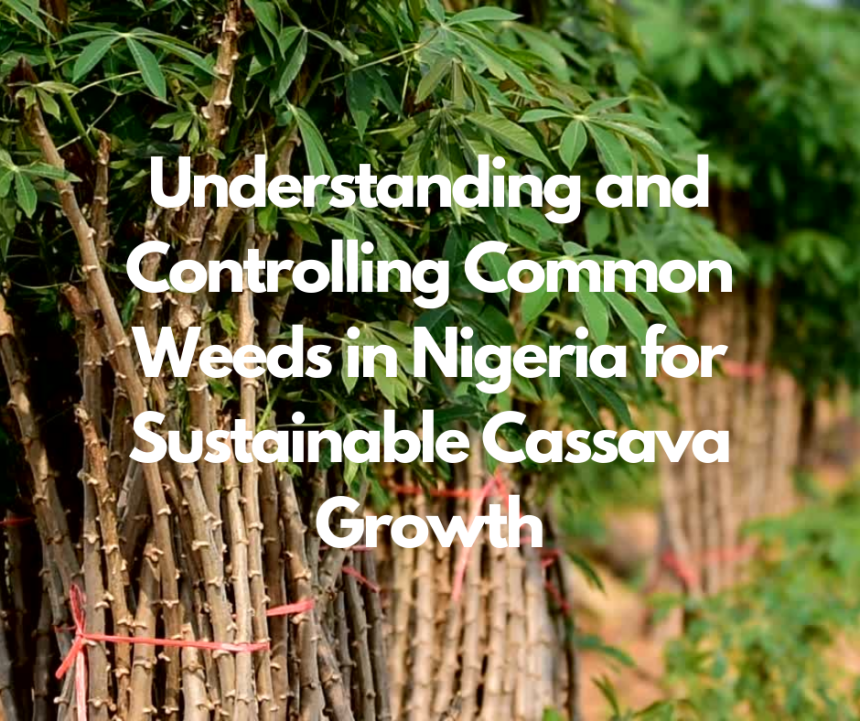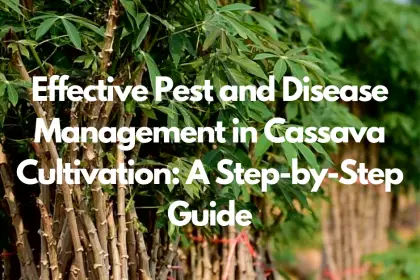Nigeria stands as the world leader in cassava production, boasting an impressive annual yield of over 54.8 million tons. However, the fight against common weeds in Nigeria poses a significant challenge to this agricultural success, particularly in controlling these pervasive plants to secure sustainable growth in cassava crops. With approximately 4.5 million farmers dedicated to cassava cultivation, it’s essential to address the national average yield, which is notably less than half of those recorded in leading Asian countries and researcher-run trials within Nigeria itself.
The crux of the issue lies in weed management, consuming 50-80% of cassava farmers’ total labor budget, with women contributing over 90% of the hand-weeding work. Such a considerable investment of time and labor highlights the urgency for efficient control methods to combat common weeds in Nigeria. The Cassava Weed Management Project plays a pivotal role in this context, aiming to support smallholder cassava growers in achieving sustainable productivity and income increases through improved weed control practices. This narrative underscores the need for innovative solutions to enhance weed management on cassava farms across Nigeria.
Understanding Herbicides
Herbicides are crucial tools in the fight against common weeds in Nigeria, especially in the context of cassava cultivation. These chemicals, designed to control unwanted plant growth, come in various forms and have specific targets and modes of action. Understanding the basics of herbicides can significantly enhance weed management strategies on cassava farms.
- Types of Herbicides:
-
- Selective Herbicides: Target only specific types of plants, sparing the desired crops.
- Non-selective Herbicides: Affect all vegetation they come into contact with, requiring careful application.
- Mode of Action:
-
- Inhibiting Photosynthesis: Prevents plants from converting sunlight into energy.
- Stopping Plant Growth: Affects the plant’s growth hormones.
- Killing the Root System: Destroys the plant’s ability to absorb water and nutrients.
- Preventing Seed Germination: Stops weeds before they can grow.
- Application and Resistance:
-
- Proper Application: Always follow the manufacturer’s instructions to minimize environmental and health risks.
- Resistance Management: Rotate herbicides and integrate other weed control methods to prevent resistance development.
Incorporating herbicides into an integrated weed management strategy, including manual weeding and good agronomic practices, can make weed control more efficient and sustainable. This approach aligns with the project’s goal of enhancing cassava productivity through innovative and effective weed management practices.
Benefits of Herbicide Use in Cassava Farms
Integrating herbicides into cassava cultivation practices in Nigeria has demonstrated significant benefits, directly impacting yield improvements and operational efficiencies. Key findings underscore the effectiveness of herbicide application:
- Yield Increase: Research indicates a notable 20-30% uplift in cassava yield when herbicides are correctly used. This enhancement is attributed to the cassava plants’ improved capacity to access sunlight, water, and nutrients, essential components for their growth.
- Effective Weed Control: Specific herbicide treatments, such as Indaziflam-based and the combination of flumioxazin + pyroxasulfone applied pre-emergence, followed by minimal manual weeding, achieved over 80% control of major broadleaf and grass weeds. This strategic approach led to the highest root yields when compared to traditional farmers’ practices and manual hoe weeding.
- Labor Reduction and Livelihood Improvement: The employment of herbicides significantly reduces the manual labor required for weeding, particularly benefiting women and children who traditionally bear this burden. Through the “Six Steps” cassava weed management approach, incorporating herbicide application, farmers have witnessed fresh yield root yields exceeding 20 ton/ha, a substantial increase from the national average of 9 ton/ha. This advancement not only elevates cassava productivity but also transforms the livelihoods of 125,000 Nigerian farm families, positioning the Cassava Weed Management Project as a pivotal model for cassava-producing states across Nigeria.
Environmental and Health Challenges
While herbicides play a crucial role in managing common weeds in Nigeria, particularly in cassava farms, their use comes with significant environmental and health challenges that cannot be overlooked.
- Environmental Impacts:
-
- Herbicide residues often dissolve in soil water, becoming part of eroding runoff that eventually contaminates water bodies. This process can lead to ecosystem impairments, affecting aquatic life and potentially disrupting local biodiversity.
- Health Risks for Agricultural Workers:
-
- Exposure: Workers handling herbicides can experience acute and chronic health issues, ranging from skin irritation and respiratory problems to more severe conditions like potential genetic mutations.
- Protective Measures: The use of Personal Protective Equipment (PPE) can mitigate exposure risks. However, factors such as discomfort, heat, and financial constraints often result in low compliance among farmers.
- Regulatory Gaps: Inadequate regulations and enforcement related to herbicide use and PPE compliance further exacerbate these risks, especially in developing countries.
- Towards Safer Alternatives:
-
- Advocating for organic weed control measures is essential. These methods not only improve soil fertility and eliminate environmental pollution but also ensure the production of healthier farm produce. Enlightening Nigerian farmers about these alternatives can pave the way for more sustainable and efficient weed management practices that safeguard both the environment and human health.
Integrated Weed Management Practices
Integrated Weed Management (IWM) combines multiple strategies to control common weeds in Nigeria, offering a holistic approach to sustain cassava growth. Recognizing the diverse nature of weeds, including grasses, sedges, and broadleaf varieties such as Siam weed and Wild poinsettia, IWM addresses the challenge they pose through a comprehensive plan:
- Eco-friendly Practices:
-
- Bacterial degradation and myco-remediation target the biological breakdown of herbicides.
- Phytoremediation and microalgae-based bioremediation utilize plants and algae to detoxify soil and water from herbicide residues.
- Cultural Practices:
-
- Land Selection and Preparation: Avoid slopes and waterlogged areas; slash and plough for older fallows.
- Tillage Operations: Perform ploughing and ridging to enhance cassava yields.
- Planting Techniques: Space cassava correctly and apply pre-emergence herbicides within 24 hours of planting.
- Post-Planting Measures: Combine land clearing, seedbed preparation, and strategic weeding to mitigate weed impact effectively.
- Techno-Efficacious Approaches:
-
- The majority of farmers employ a blend of herbicides and manual hoe weeding, demonstrating the effectiveness of integrating chemical and physical weed control methods.
This approach not only targets the physical removal of weeds but also focuses on preventing their spread and minimizing their impact on cassava crops through a balanced use of chemical, biological, and mechanical methods.
The Role of Education and Government Support
Weed management practices are pivotal for enhancing crop yields, with ineffective methods severely impacting productivity. In Nigeria, traditional weed control techniques are not only laborious and costly but also pose a barrier to expanding farm sizes. This underscores the critical need for comprehensive training in Integrated Weed Management (IWM) practices, aiming for food self-sufficiency in regions like Kwara State.
- Training and Education:
-
- Government and educational institutions should collaborate to offer extensive training programs focused on all aspects of IWM.
- The International Institute of Tropical Agriculture (IITA) has developed a field guide aimed at increasing the technical knowledge of extension agents, focusing on controlling weeds in cassava farms for sustainable growth.
- Government Support and Funding:
-
- It’s essential for government at all levels to fund training for personnel to control weeds effectively, reducing the high cost of weeding which inflates production costs by 40%.
- A 5-year research project, supported by a $7.7 million grant from the Bill & Melinda Gates Foundation, demonstrates a commitment to sustainable weed management practices, with potential as a livelihood transformation model for cassava-producing states in Nigeria.
Conclusion
Through this article, we have traversed the multifaceted challenges and solutions surrounding weed management in Nigeria’s cassava farms, underlining the pivotal role of integrated approaches in securing sustainable growth and productivity. From the labor-intensive traditional methods that dominate weeding practices to the innovative application of herbicides and eco-friendly Integrated Weed Management (IWM) practices, the narrative weaves a comprehensive picture of current endeavors and their implications. It’s clear that the effective control of common weeds not only promises increased cassava yields but also heralds a leap towards improving the livelihoods of countless Nigerian farm families, particularly highlighting the critical involvement of women in these agricultural processes.
Looking ahead, the embrace of education, governmental support, and international collaboration emerges as crucial pathways to overcoming existing challenges. The Cassava Weed Management Project, alongside the strategic use of herbicides and the exploration of safer alternatives, embodies a beacon of progress in this journey. The promising outcomes of these integrated strategies resonate beyond mere productivity; they echo the potential for environmental conservation and health safeguarding, urging a collective move towards practices that are both effective and sustainable. As we consider the road ahead, the lessons and findings discussed reiterate the importance of ongoing research, innovation, and community involvement in nurturing a future where cassava – and the farmers who cultivate it – flourish unfettered by the weeds that once curtailed their potential.
FAQs
What is the most effective method for managing weed growth?
Herbicides are widely recognized as the most effective and efficient way to manage weeds. Some herbicides are specially designed to target weeds without harming nearby plants, making chemical control a powerful strategy for weed management.
Which herbicide is recommended for cassava crops in Nigeria?
In Nigeria, Lagon is recommended as a selective herbicide for use in cassava cultivation, as it targets weeds without damaging the cassava plants.
How are weeds typically managed in tree crop plantations?
The most common mechanical weed control methods in tree crop plantations include tillage and mowing. These techniques are often employed to manage weed populations.
What are the optimal conditions for growing cassava?
For successful cassava cultivation, it is ideal to have an annual rainfall of at least 1000 mm, with a rainy season lasting at least 6 months and monthly rainfall of 50 mm or more. The soil should be well-drained and at least 30 cm deep, avoiding sandy, clayey, stony, or salt-affected soils. In areas prone to waterlogging, it is advisable to plant cassava on raised soil mounds or ridges.



